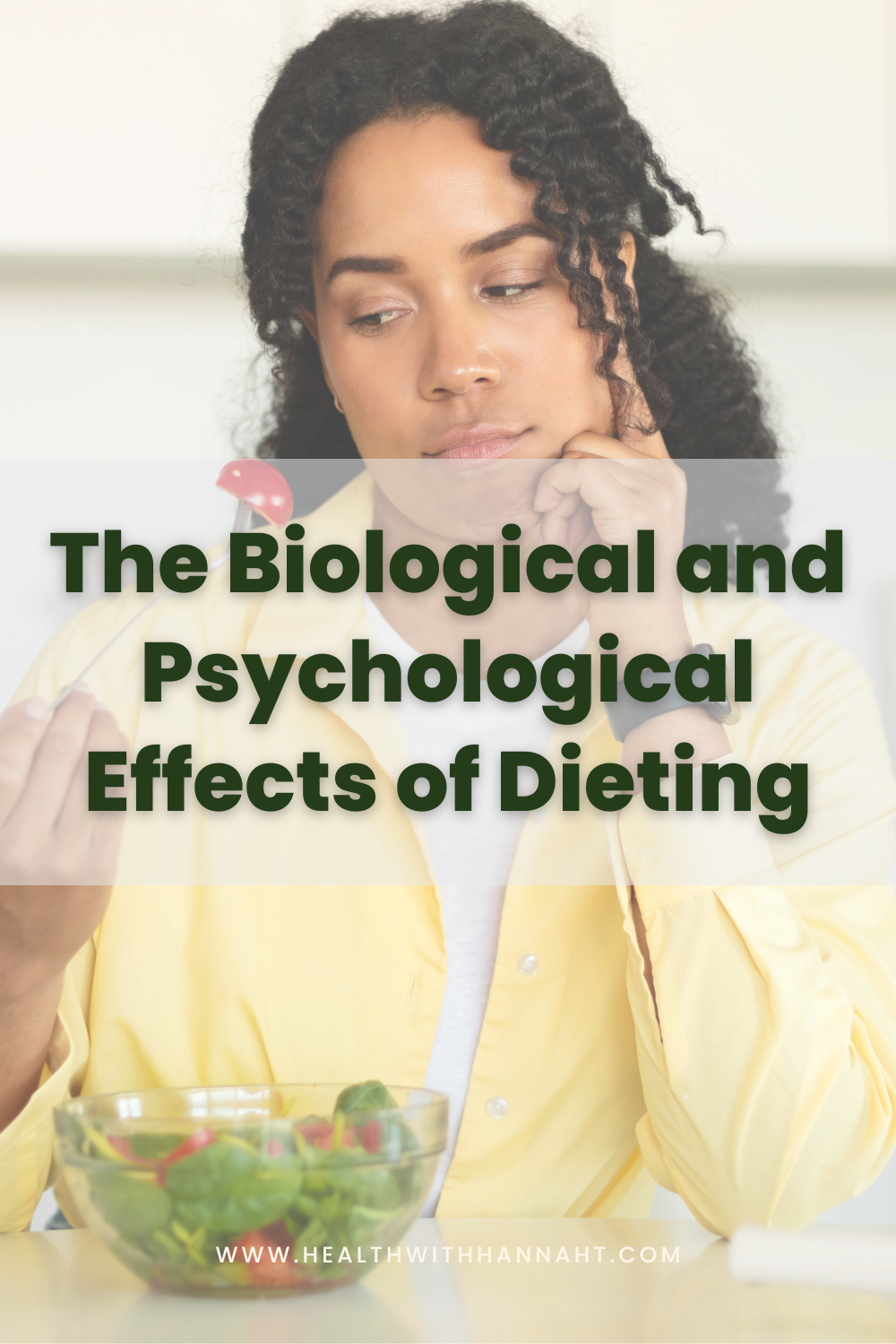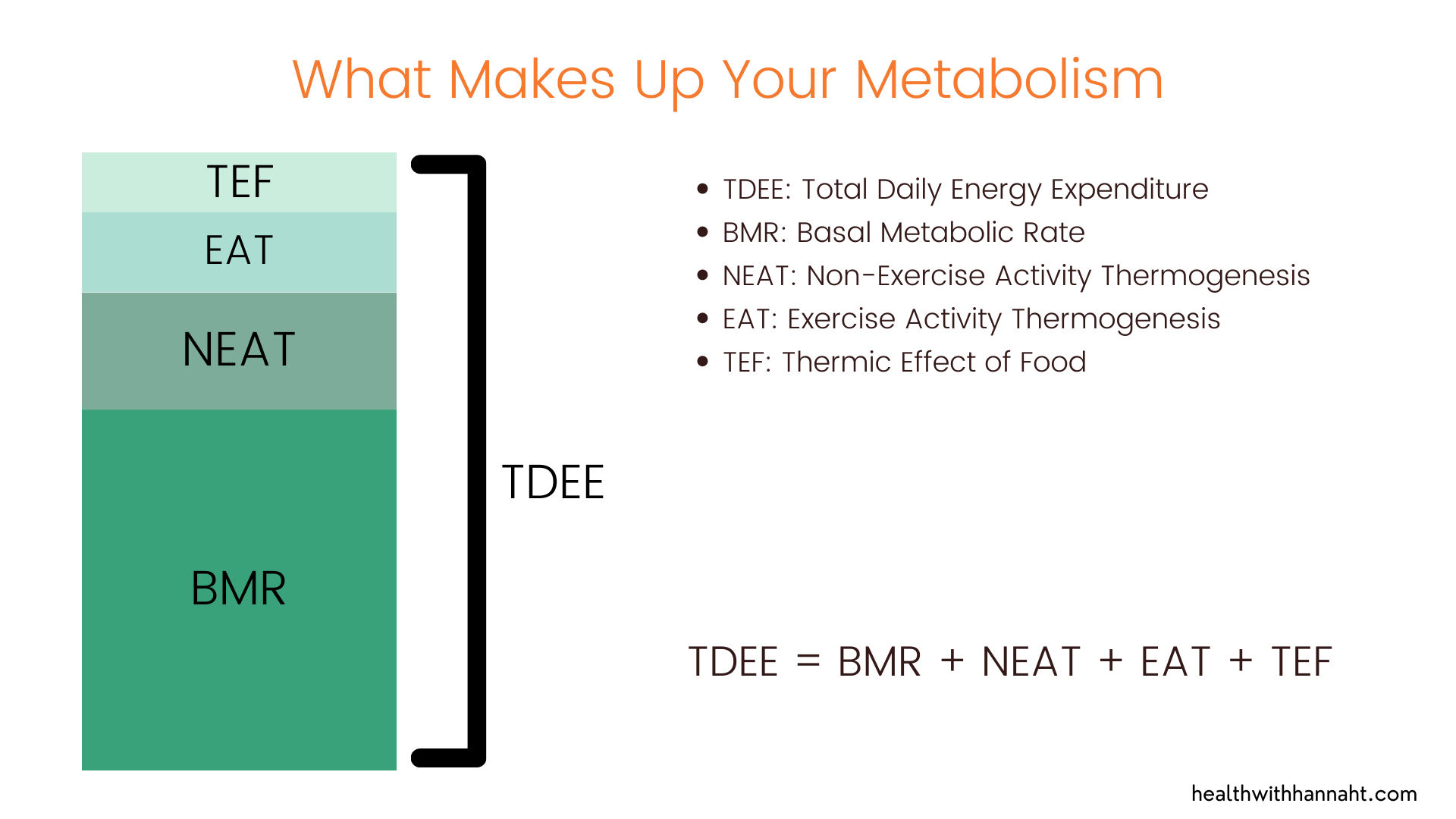The Biological and Psychological Effects of Dieting
I am a registered dietitian, but more specifically, I would call myself an anti-diet dietitian. Why? Because diets don’t work.
You may have heard this claim about diets before, especially if you have been around me or other dietitians. But you may be asking - if diets don’t work, why are there so many of them? And why are people always trying new ones? Depending who you surround yourself with, it can seem like everyone is always talking about which diet they are on and which one is the best.
There are seemingly countless diets and people jump around from one to another - because they don’t work. They quite literally set us up for failure. Many of them may result in weight loss to begin with, but short term weight loss is not what I would call “success”. I would argue that a diet is not successful just because you lost weight.
Not to mention that our health is so much more than just a number on the scale. Surprisingly to many, dieting is actually a very large indicator of weight gain, as I’ll explain more in this post. So even if you lost weight initially, that weight loss may be difficult to maintain.
In this blog we will cover:
What is dieting?
Why diets don’t work
Hormonal effects of dieting
Metabolic effects of dieting
Psychological effects dieting
What to do instead of dieting
Disclaimer: if you have maintained a diet for a long period of time and feel that it works for you, that’s great. This post may not be for you!
What is dieting?
Dieting is the regulation of your consumption of foods and beverages with the intention of weight loss. In other words - diets demonize food and particular ways of eating.
Diets have never worked, but this concept has been talked about a lot more since the Biggest Loser study was published in 2016. As you may already know, many contestants on The Biggest Loser TV show initially lost a significant amount of weight. This was the premise of the entire show. But a follow up study found that many of them gained some, if not all, of their weight back and experienced decreased resting metabolic rates.
This is not because they "lacked willpower" or were "too lazy" to keep the weight off. It is because their biology was fighting to get them back to a set point weight. The weight loss methods were very extreme and included very low calorie diets and intense exercise for long durations. The weight loss was unsustainable to begin with.
Why diets don’t work
The human body has many compensatory mechanisms in place to protect us when we restrict our calories. We can’t “outsmart” our biology.
When you go on a diet, you may notice that food is just so appealing. Your cravings go through the roof, you feel like you never experience fullness, and you can’t stop thinking about when your next meal will be. This is because the body experiences hormonal and psychological responses to restrictive diets .
Hormonal effects of dieting
There are many different brain and gut hormones involved in appetite regulation. The big two are ghrelin and leptin. Chronic dieting can lead to increased ghrelin and decreased leptin.
Ghrelin - the hunger hormone
Ghrelin is secreted mainly from the stomach lining and travels through the blood to your brain, signaling that it's time to eat. It rises before meals and lowers after meals and this cycle repeats every 3-4 hours. When we restrict our calories (aka go on a diet), ghrelin will increase and make us feel hungrier.
Leptin - the satiety hormone
Leptin is a hormone that's produced by fat cells, and it works to suppress appetite in the brain. Leptin lets us know when we have eaten enough food.
Leptin can actually decrease with weight loss, which may play a role in why diets fail. When you diet, your body starts to notice "Hey... I'm not getting enough food - something is wrong". Your body tries to fix this by decreasing your amount of leptin so you stay hungry and your body encourages you to eat more. So if you have dieted before and noticed that you got increasingly hungry - this may explain why. It was not because you lack willpower or motivation.
You might be thinking - if leptin is produced by fat cells, wouldn’t those with more body fat feel fuller faster and have lower appetites? Some individuals can develop leptin resistance, meaning that even though leptin is being produced by the fat cells, the message is not being received by the body.
What can be done about leptin resistance? Don’t diet in the first place! Dieting often leads to weight gain in the long run, which can lead to this leptin resistance.
Metabolic effects of dieting
What is metabolism?
Metabolism is the chemical processes that occur within a living organism in order to maintain life. Our TDEE (total daily expenditure) is a quantification of metabolism. TDEE is the energy required by our metabolism in a 24 hour period. There are four ways that our body burns calories - BMR (basal metabolic rate), NEAT (non-exercise activity thermogenesis), EAT (exercise activity thermogenesis), and TEF (thermic effect of food). So, to put it more concisely:
TDEE = BMR + NEAT + EAT + TEF
Basal metabolic rate: BMR makes up about 60-70% of our total daily energy expenditure. These are the calories we burn at rest. Even if we never did anything, we need this many calories to keep our body functioning! Don't eat less than your BMR. Your organs will thank you.
Non-exercise activity thermogenesis: NEAT makes up about 20-30% of our total daily energy expenditure. This includes all activities besides sleeping, eating, and intentional exercise.
Exercise activity thermogenesis: EAT makes up about 10-15% of our total daily energy expenditure. This includes INTENTIONAL exercise, where relatively large amounts of calories are burned in a shorter time. EAT does not play a large role in our energy balance. This is why exercising for the sole purpose of losing weight often is unsuccessful. But this does not mean that you should not exercise or that it is a waste of your time. Exercise is important for many other reasons!
Thermic effect of food: TEF makes up about 5-10% of our total daily energy expenditure. Our metabolic rate increases after we have eaten a meal. Protein has highest thermic effect as it requires the most energy to break down and digest however TEF does not play a large role in energy balance.
Metabolic changes when on a diet - BMR
Our weight is dictated by an energy balance of calories consumed and calories that we expend. If we eat less than our TDEE, we should lose weight. If we eat more than our TDEE, we should gain weight.
We already discussed how dieting can actually lead to us increasing the calorie intake, but it can also lead to us also burning less calories. Basal metabolic rate will decrease when we diet and lose weight because there will be less body mass requiring energy. Less fat and less muscle = less calories needed.
Muscle mass is more metabolically active than adipose tissue, meaning that it requires more calories. So if you lose large amounts of muscle mass when you diet, your BMR will decrease significantly more than if you are losing mainly fat mass. With rapid weight loss, we often cannot spare muscle mass and BMR will decrease more rapidly.
Metabolic changes when on a diet - NEAT and EAT
NEAT and EAT will decrease while dieting because less energy is required to move a body that weighs less. So generally, when you lose weight, your body will burn less calories when it is active.
When you diet, you may also experience decreased drive to exercise, which of course will mean that your EAT will decrease.
Metabolic changes when on a diet - TEF
TEF will also decrease while dieting because if we eat less, than we aren’t going to be burning as many calories from the digestive process.
Bottom line: all aspects of your metabolism may decrease as a result of dieting, so you will need to eat less to maintain any weight loss that occurs. And you can only “eat less” for so long.
Metabolic changes when on a diet - metabolic adaptation
Another phenomenon with weight loss is something called metabolic adaptation. Metabolic adaptation is a normal mechanism that exists to keep you alive. Your body does not like to feel “starved”, so it slows metabolism down so that you need fewer calories to survive. It is a survival mechanism. It slows down to become more efficient. It stretches out each calorie’s functions. And at that point, you are no longer in a caloric deficit because your metabolism has adapted. This is where weight regain may result.
Set point weight theory
Some theorize that our bodies have a set point weight that they want to be at and no matter how hard we try to change it (aka through dieting), our biology is going to fight us to get to that weight. Learn more about the set point weight theory here.
Psychological effects of dieting
Here are just a few ways that our mental health can be impacted by dieting:
Increased risk of disordered eating or developing an eating disorder.
Less joy in the eating experience.
Labeling foods as “good” or “bad”, resulting in binary thinking regarding food.
Increased cravings and food guilt when we “give in” to our cravings.
Preoccupation with food and our body.
What to do instead of dieting
Focus on your overall health, not your weight
Your health is not determined by the size of your body. Remove weight from the focus.
Understand that health is an individual thing. Healthy to someone else may not be healthy for you.
Understand that your thinness does not equal health and everyone’s body is healthy and happy at different weights.
Stop aligning a number on the scale with your worth and your values.
Stop buying into the idea that you have to have a certain body shape/size/weight to be beautiful, attractive, healthy.
Focus on improving your relationship with food and exercise, your body, and your mental health.
Think addition rather than subtraction. What can you add to your diet to improve its quality and your satisfaction?
Incorporate Intuitive Eating
According to the Intuitive Eating website: “Intuitive Eating is a self-care eating framework, which integrates instinct, emotion, and rational thought and was created by two dietitians, Evelyn Tribole and Elyse Resch in 1995. Intuitive Eating is a weight-inclusive, evidence-based model with a validated assessment scale and over 100 studies to date.”
Intuitive eating is about trusting your inner body wisdom to make choices around food that feel good in your body, without judgment and without influence from diet culture.
Intuitive eating is not a diet and it is not a tool for weight loss. It’s not “giving up”, or eating with reckless abandonment, but giving unconditional permission to eat with curiosity and non-judgement, so as to remove the stigma, guilt, and fear around food.
Learn more about getting started with intuitive eating here.
Focus on nutrition education rather than food rules
Diets don’t actually teach you about nutrition. They just tell you which rules to follow. We need to learn about how food actually affects our body and makes us feel rather than just applying arbitrary rules.
Get evidence based nutrition information from reliable sources (such as registered dietitians) or, if you like diving into the science yourself, you can do that as well.
Don’t fall for trends
Science is cool and research is happening all the time, but nutrition science really doesn’t move all that quickly. Trends will come and go. This is why there are always new diets and diet behaviors popping up. Try not to fall victim to the latest trends that you see on social media.
Don’t blame yourself
You did not “fail” that diet because you lack willpower. In classic break-up terms - it’s not you, it’s them.
Learn more
Featured podcast episode
Want more help on your intuitive eating journey?
Join my membership to become part of a community of ex-dieters working towards food freedom and making peace with food so they no longer need to go on diets.


































